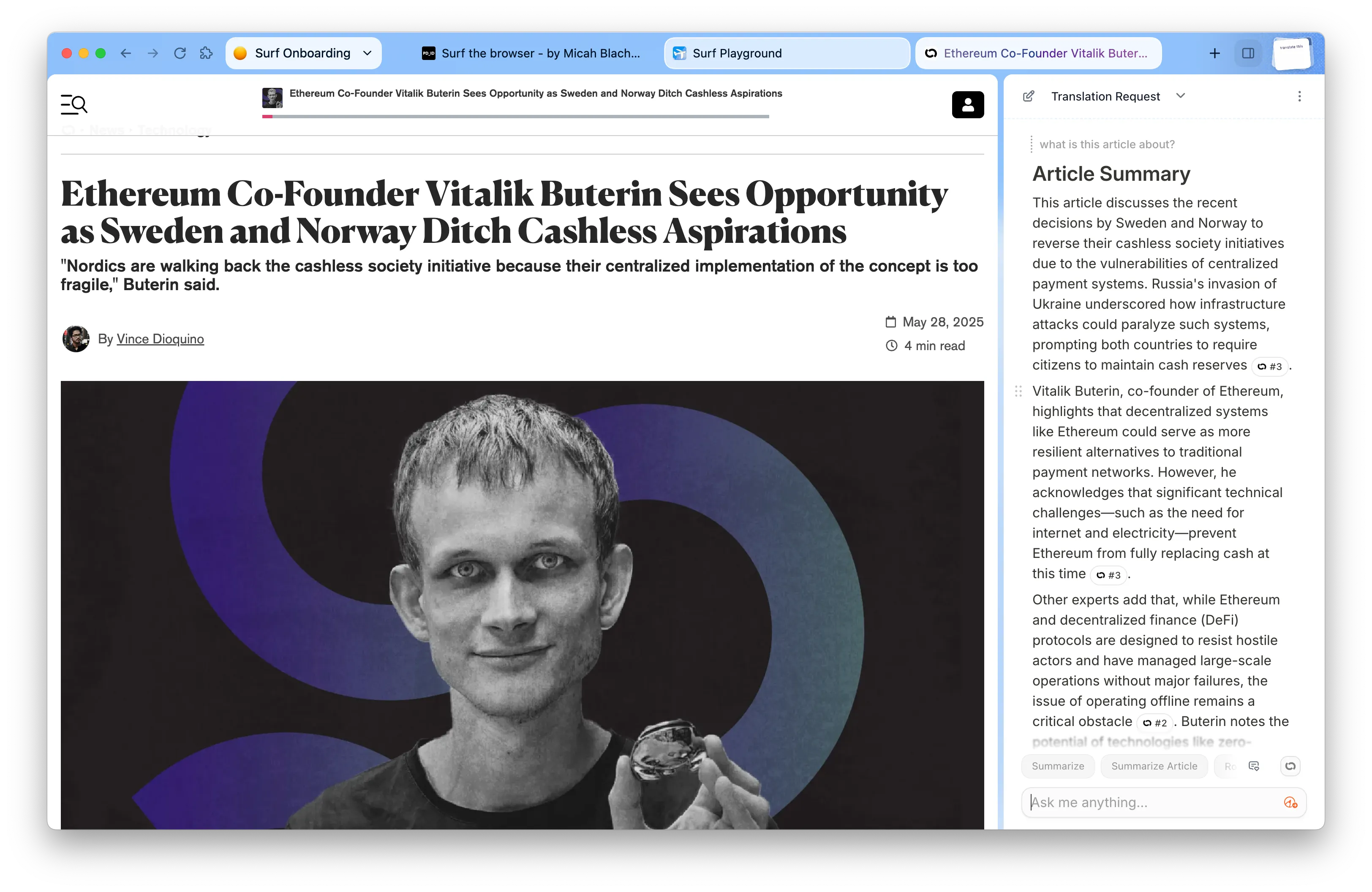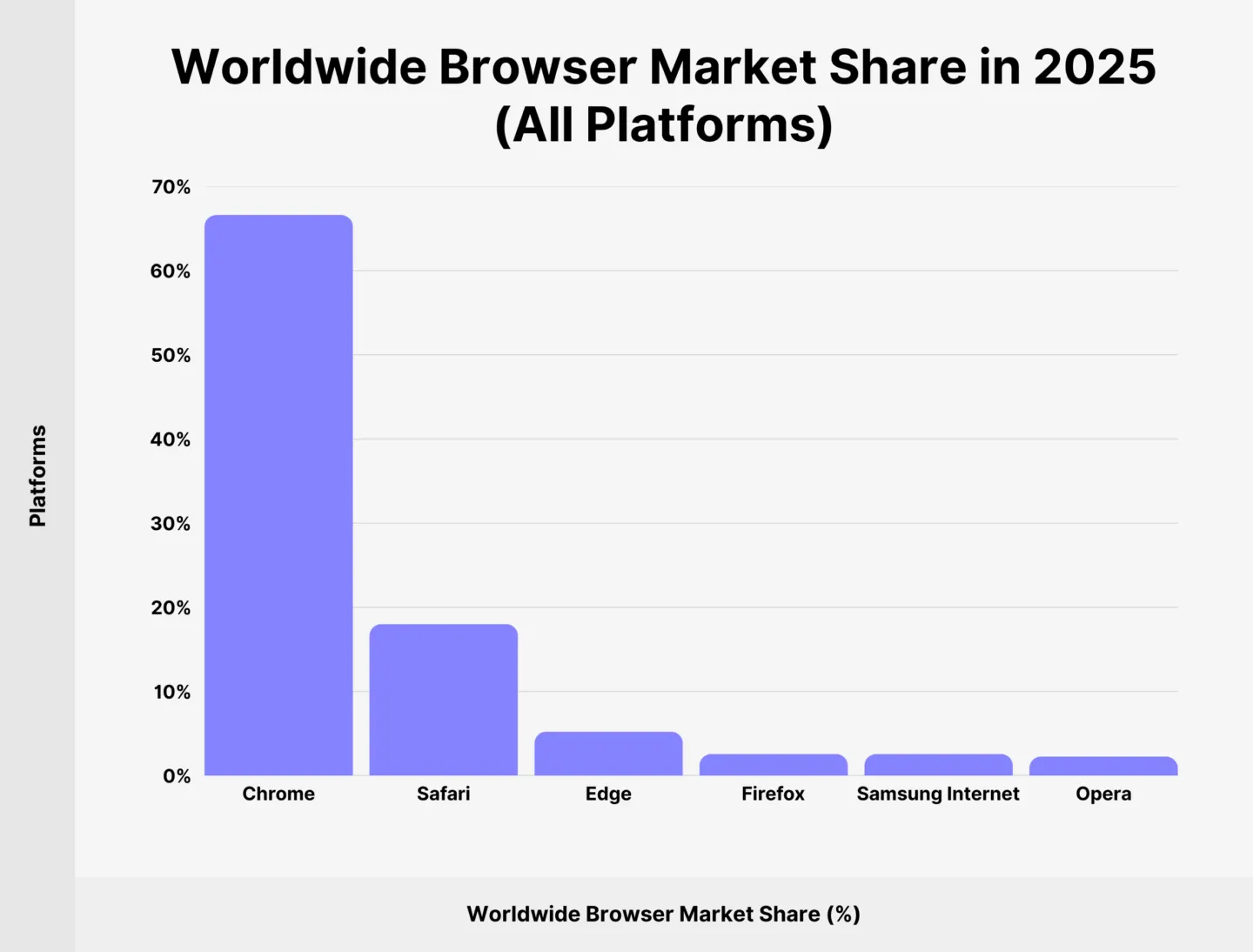In brief
- Opera just launched Neon, an AI browser that codes websites while you watch Netflix—seriously.
- The Browser Company killed Arc to build Dia, betting everything on AI that chats with your tabs.
- Despite the hype, these browsers combined have captured a negligible market share.
Remember when choosing a web browser meant picking between Chrome or Firefox—or Internet Explorer and Netscape, if you’re of a certain age? Those were simpler times. Today, a new breed of browsers powered by artificial intelligence is attempting something crazy: making Chrome sweat.
Opera dropped Opera Neon today, billing it as “a browser for the agentic web.” If that sounds like marketing fluff, then consider this: It can literally code a website while you’re busy doom-scrolling Twitter.
But Opera isn’t alone. Other companies are also trying to redefine the way people browse the web—with AI at the epicenter of an emerging and radically different internet.
Here’s a rundown of the most promising AI-first browsers.
Opera Neon: Pay for an AI browser that actually ships code
Opera Neon, announced today with surprisingly little fanfare for something claiming to be the “world’s first AI agentic browser,” represents Opera’s boldest bet since it convinced people to install a browser for its Web3 capabilities.
The technical architecture behind Neon’s three-pillar approach—Chat, Do, and Make—reveals sophisticated engineering that goes well beyond marketing buzzwords.
“Make” is about building fully functional web applications.
“Make takes complex ideas from prompting to full-scale results—content, games, and web apps. Because big ideas deserve more than quick replies,” Opera said in an official announcement. “Neon’s AI agent understands and interprets what you want, then makes it for you. Bring your ideas to life, and even run multiple instances in the cloud at the same time.”
The entire process happens in cloud-based virtual machines that continue working even after you close your browser—log back in hours later to find your application ready for deployment.
“Do” showcases Opera’s understanding of real-world frustration.
Task automation isn’t new, but Neon’s implementation wants to take things further. The browser maintains what Opera calls “interaction maps” of major websites—not just static document object model or DOM structures, but a dynamic understanding of how sites actually work. For example, if you need to book a flight or find the cheapest movie tickets in your city, Neon will be able to know everything you need to do the job from scratch.
And “Chat” wants to change the way people interact with search engines and web browsers.
Instead of focusing on keywords, natural language will be the best way to talk to our browser. Start a query in English about Japanese restaurants, switch to Japanese mid-conversation, and Neon maintains context while adjusting its cultural references and search parameters. Ask it to summarize an article or explain something you didn’t understand, and the browser will be able to interact with you and do what you asked it to.
The premium-only model will work on a subscription basis. That sucks, but also makes sense when you understand what’s happening behind the scenes: Every Make operation spins up actual cloud computing resources, Do operations consume API calls to legitimate services, and Chat queries hit enterprise-grade language models.
Dia: Arc’s killer and successor
The Browser Company became famous in the tech space for its Arc browser, beloved by geeks and developers, launched in 2022. That’s over now. This week, the company announced it’s saying goodbye to Arc to focus full time on its until-then side project: an AI-powered browser that goes beyond being just another Chromium fork with AI plugins.
The headline feature, “chatting with tabs,” undersells the technical sophistication. Dia employs what it calls context-aware tab intelligence, using a combination of context analysis, content extraction, and real-time page monitoring to maintain living representations of each tab’s content.
So, Dia puts AI to work to radically simplify your browsing experience.
“I could take the tab with ‘notes on the state of Virginia,’ the tab with ‘The Federalist Papers,’ and a tab with my paper and engage with the sources simultaneously. After Dia gives me the output, I can ask follow-up questions to make sure I understand and that the info it found is accurate (never fully trust AI’s ability to give you what you want!),” Reddit user Fredninja wrote while explaining why Dia is so different from other browsers. “Could I paste these into AI? Yes. But I have to keep switching between tabs.”
With Dia, each tab runs a lightweight AI agent that maintains a semantic understanding of the page content. These agents communicate through a central orchestrator that manages context and prevents the memory bloat that killed many ambitious browser projects.
The natural language command system goes beyond simple voice commands. Users can issue complex, multi-step instructions and Dia will understand. For example, asking a model to email a summary of the five most important dates in a business plan on a URL will prompt the model to analyze the site, understand its information, identify what the user requires, and execute the final task of composing and sending the email.
You can register for Dia’s waiting list here: https://www.diabrowser.com/
Surf: The ‘alpha’ still finding itself
Deta’s Surf browser, currently in alpha, promises to organize your digital life with AI-powered “contexts”—basically folders on steroids.
The browser employs machine learning algorithms to analyze your browsing patterns and automatically suggest contextual folders for organizing content. When you’re researching complex themes, bouncing between ArXiv papers and YouTube explainers, Surf recognizes the thematic connections and proposes grouping them into a dedicated context.
So ideally, without doing a lot on your side, Surf would be able to organize your dozens of tabs into groups that make sense, solving the problem of losing track of important URLs after opening dozens of links.

Under the hood, Surf integrates several compelling features. The OCR capability for PDFs can parse complex academic papers, extract key concepts, and even suggest related contexts based on the content. The built-in chatbot goes beyond simple webpage manipulation to being able to synthesize information across multiple tabs within a context (which goes beyond the capabilities of your typical AI chatbots or even agents), answer questions about the collective content, and even generate summaries that draw from various sources you’ve collected.
You can download and try Surf here: https://deta.surf/
Comet: Perplexity’s moonshot
Perplexity AI’s Comet browser is all about “agentic search”—essentially using AI to make your browser work as an assistant instead of an information aggregator.
This browser is not yet publicly available, but Perplexity has been hyping its generative AI-powered capabilities for months. Rather than simply forwarding queries to search engines, Comet employs a multi-stage reasoning pipeline. When you ask a complex question like “What are the regulatory implications of the EU’s AI Act for American startups?”, the browser doesn’t just search—it decomposes the query, identifies required knowledge domains, searches multiple sources in parallel, synthesizes findings, and presents a coherent answer with citations.
The browser should also be able to understand temporal references, meeting contexts, and document relationships—basically aiming to do what Google itself has struggled to deliver: truly intelligent personal information retrieval.
The browsing history integration raises obvious privacy concerns, especially with Perplexity’s flirtations with ads tailored to your private information. Comet maintains a local knowledge graph of your browsing patterns, allowing it to understand your expertise level and interests. Ask about machine learning, and it tailors responses based on whether you’ve been reading beginner tutorials or diving into papers on transformer architectures. The system processes everything locally using efficient vector embeds, addressing some privacy concerns while maintaining responsiveness.
You can join the waiting list here: https://www.perplexity.ai/comet
Legacy rules: Chrome is still the king
While these AI upstarts duke it out for table scraps, Chrome sits pretty with its 66% market share, occasionally tossing in features like Gemini integration to show it’s paying attention. Microsoft Edge incorporated Copilot, Safari’s doing… Safari things, and Firefox continues to exist (bless its open-source heart).
The harsh reality? According to recent data, these new AI browsers don’t even register on market share reports from 2025. They’re statistical rounding errors in Chrome’s empire without actually threatening the business model.

Yet there’s reason for cautious optimism. Each browser targets specific pain points—Arc (RIP) for power users, Opera Neon for automation enthusiasts, Surf for digital organizers, Comet for researchers, Dia for simplicity seekers, etc. If even one captures 5% market share, it could force the incumbents to innovate beyond niche AI features.
Edited by Andrew Hayward
Generally Intelligent Newsletter
A weekly AI journey narrated by Gen, a generative AI model.







